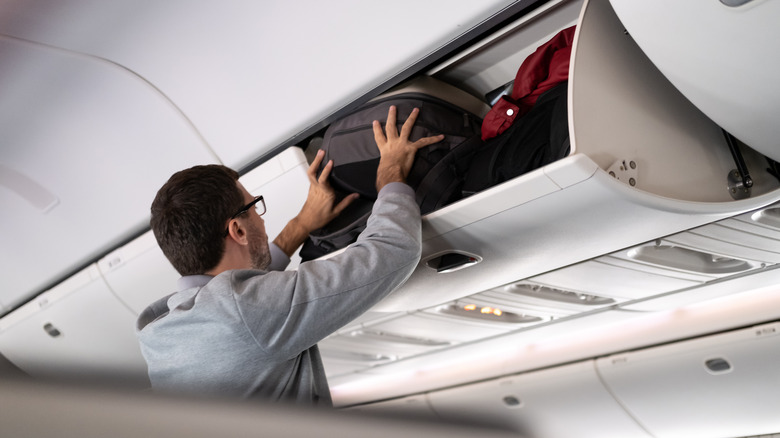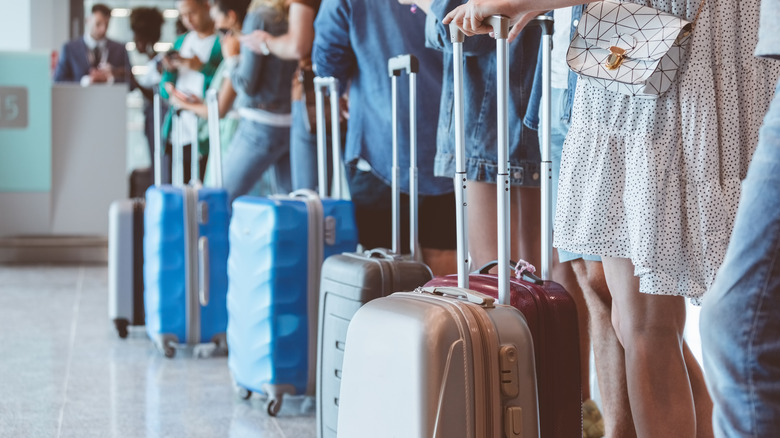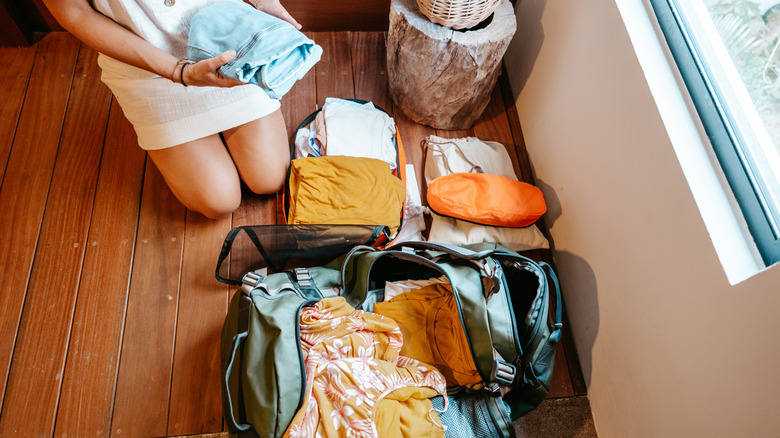How Your Bulky Luggage Could Actually Cause A Flight Delay
If you've taken a flight recently, you likely noticed a shortage of overhead bin space for carry-on bags. Nowadays, more airlines are charging for checked luggage, which has driven every traveler to stuff as much as possible in their carry-on to avoid paying baggage fees.
The problem, however, is that many cabins aren't equipped to hold a carry-on suitcase for every passenger, especially when those suitcases are beyond dimension limits. As a result, overhead bins are often packed to the brim.
Besides making it difficult to cram bags in the tiny overhead compartments, bringing on bulky luggage can also trigger flight delays. When flight attendants deem a bag too large for the overhead bins — or when one bag is so large that it prevents other bags from being stored beside it — the luggage will have to be checked and placed in the cargo hold, even if it already made its way on board. This adds time to the boarding process that can quickly delay a scheduled flight. Since planes operate on such a strict schedule, even a five-minute delay can compound throughout the day. To put it simply, if you choose to overstuff your carry-on bag and it doesn't fit, expect to arrive at your destination later than planned.
You might have to pay a fee for oversized luggage
When too many passengers choose to travel with carry-on bags, airlines may require some to gate-check their luggage. This involves checking the item at the gate upon boarding, where it will then be put in the cargo hold along with other checked pieces. When done at the airline's discretion due to lack of overhead bin space, gate checking your bag is typically free of charge.
However, if you're forced to gate-check because your luggage is larger than the carrier's size allowance, you could be required to pay an additional fee for the service. The same goes for luggage that's found to be too heavy for the cabin. For example, Ryanair clearly states on its website that bags that don't fit in the baggage sizers at the boarding gate will be checked and subject to a fee. These fees are often much higher than the cost of checking a bag during booking.
To avoid both delays and extra charges, check your airline's baggage dimensions before heading to the airport. If you shove a few new items in your luggage after treating yourself to some duty-free shopping, place your bag in the gate sizer and offer to check the bag if it's over the limit.
Make sure your carry-on fits before heading to the airport
Besides measuring your bag before boarding, you can increase your chances of making your carry-on fit by choosing the right material. When comparing hardside and softside luggage, opt for the latter, ideally if it's in an easily malleable shape. A soft duffel bag, for example, is more likely to conform to even the narrowest overhead bins than a hard case.
Be mindful of adding bulk to your luggage, even if the tag says the piece is suitable for plane cabins. Sure, a suitcase may fit an airline's size restrictions when you buy it, but that can change once you pack it full of clothing and other items. In particular, be careful to not overstuff external pockets or rely on extender zippers, which could put your bag over the limit.
Finally, divide your belongings between your carry-on and personal item, ensuring both meet your air carrier's size guidelines. Then, place your personal item under the seat in front of you to leave more space in the bins for other passengers. Remember, if everyone's items fit, you'll be less likely to run into frustrating delays.


